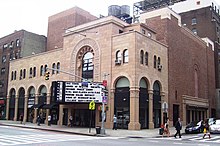Yiddish Art Theatre



The Yiddish Art Theatre was a Yiddish theatre company of the 20th century in New York City. The organization was founded in 1918 by actor and impresario Maurice Schwartz, to present serious Yiddish drama and works from world literature in Yiddish.[1][2]
History
[edit]At its opening on August 30, 1918, Schwartz's company was housed at the Irving Place Theatre in Union Square, Manhattan.[3][4] It performed there for three theater seasons.[4] For the beginning of the 1921/1922 theater season the company moved to the Garden Theatre at Madison Avenue and 27th Street, where they remained on and off for the next four seasons, through spring 1925.[4] It was at the Garden Theatre that Schwartz first billed the company as the Yiddish Art Theatre.[5][6] Over these first years the company presented works by playwrights including Leonid Andreyev, S. Ansky, Sholem Aleichem, Jacob Gordin, Maxim Gorky, Peretz Hirschbein, David Pinski, Arthur Schnitzler, George Bernard Shaw and Oscar Wilde.[4]

The Garden Theatre was part of the second Madison Square Garden complex, and in the face of plans to demolish the complex the Yiddish Art Theatre moved to the Nora Bayes Theater on West 44th Street in fall 1925.[7] Their tenancy there was brief, as the next year the Yiddish Art Theatre moved to its own purpose-built theatre: the Louis N. Jaffe Theater, a Moorish Revival theatre on Second Avenue in the heart of the Yiddish Theatre District which Brooklyn developer and prominent Jewish community leader Louis Jaffe had built in 1925–1926 to house the company.[1] Shows produced by Maurice Schwartz at this new venue included a production of "Yoshe Kalb" which ran for 300 performances.[8]
The Yiddish Art Theatre operated for approximately 32 years from its founding, finally disbanding in 1950.[9][10] Over that time it performed classics of Yiddish, European and English theater, ranging from works by Sholem Aleichem to William Shakespeare.[11]
References
[edit]- ^ a b James Murray; Karla Murray (January 27, 2017). "The Urban Lens: Inside the Village East Cinema, one of NY's last surviving 'Yiddish Rialto' theaters". 6sqft. Retrieved March 5, 2017.
- ^ Amanda Seigel (March 18, 2014). "The Yiddish Broadway and Beyond". New York Public Library. Retrieved March 5, 2017.
- ^ "German Drama to Move; Irving Place Theatre Will Be Yiddish Playhouse". The New York Times. February 14, 1918. Retrieved March 5, 2017.
- ^ a b c d Zalmen Zylbercweig (ed.), "Moris (Avrom Moyshe)", Leksikon fun yidishn teater [Lexicon of the Yiddish Theatre] (in Yiddish). Vol. 3. New York: Hebrew Actors' Union; Elisheva, 1959. cols. 2327–2368; here: 2334–2340.
- ^ Zylbercweig (1959), col. 2336.
- ^ David S. Lifson (1965). The Yiddish Theatre in America. New York: Thomas Yoseloff. pp. 350–351.
- ^ Zylbercweig (1959), col. 2340.
- ^ Annie Cofone (June 8, 2012). "Strolling Back Into the Golden Age of Yiddish Theater". The Local – East Village. Retrieved March 5, 2017.
- ^ Lifson (1965), p. 370.
- ^ "Maurice Schwartz, Actor, Dead; Founder of Yiddish Art Theatre". New York Times. May 11, 1960. Retrieved May 19, 2020.
- ^ Richard F. Shepard. "Schwartz, Maurice." Encyclopaedia Judaica. 2nd ed. Macmillan Reference USA, 2007. Vol. 18, pp. 186–187. Retrieved via Gale Books database, May 19, 2020. Also available online via Encyclopedia.com.
